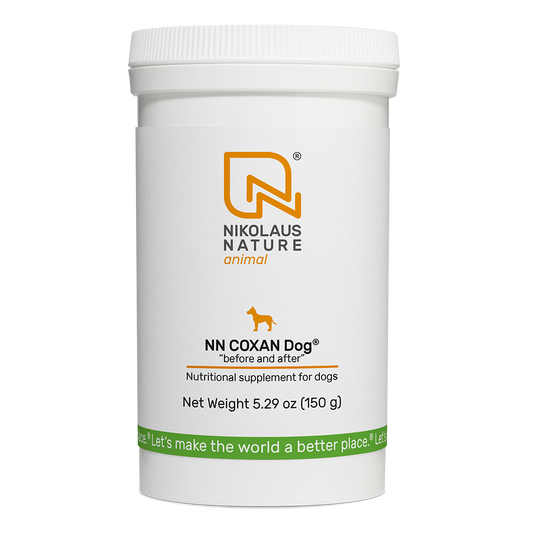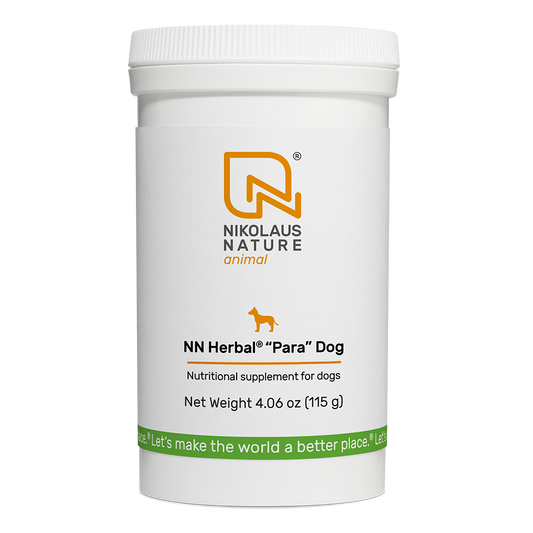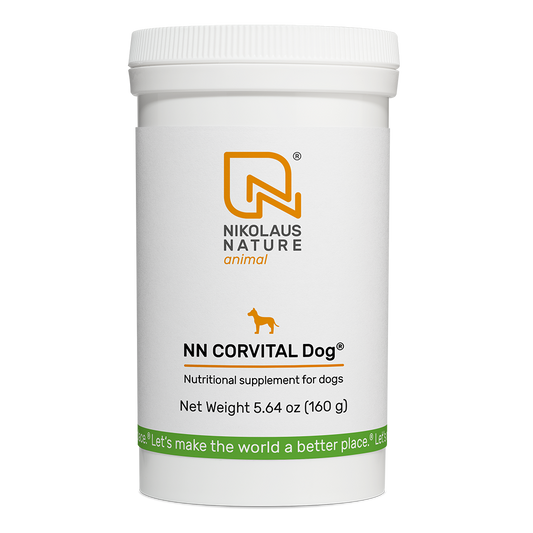How to Get Rid of Dry Skin on Dogs
Dry skin is a surprisingly common issue for dogs, affecting a large amount of dogs daily. Seeing your dog uncomfortable and itchy is heart-breaking, and untreated dry skin can even leave them vulnerable to other secondary infections. But don't worry – there's hope! With simple changes at home and easily accessible remedies, you can help restore your dog's skin.
Keep reading to learn about the reasons behind your pup's itchy skin and effective home remedies to keep your dog's skin happy and healthy.

Reasons Why Your Dog has Dry Skin
Figuring out why your dog's skin is so dry is the first step to finding the right solution. Here are some common reasons behind that itchy, flaky skin:
-
Parasites
External parasites are a common culprit behind dry, irritated skin in dogs. They can lead to several skin conditions, including seborrheic dermatitis, ringworm, and mange.
Mange is a skin disease caused by microscopic mites. There are two primary types affecting dogs. Demodectic mange (caused by Demodex mites) is often seen in puppies and dogs with weakened immune systems. As well as Sarcoptic mange (canine scabies) caused by the Sarcoptes scabiei mite, which is a highly contagious form of mange that creates severe itching, redness, sores, and crusting of the skin.
Cheyletiellosis, also known as "walking dandruff," creates scaling and flaking skin that resembles dandruff – hence their nickname. Lice also feeds on skin debris or blood and can also contribute to dry skin issues in dogs.
Note: Some forms of mange, like scabies, can be transmitted to humans. We recommend taking precautions when handling a dog with suspected mange and consulting with your veterinarian or doctor for advice.
-
Allergies
Dogs can suffer from allergies just like we do and can develop allergies that trigger a range of uncomfortable clinical signs. Common allergens include food ingredients, environmental irritants (pollen, dust, dander, etc.), and even flea saliva.
Atopic dermatitis is a frequent result of untreated allergies and presents with dry, itchy, and inflamed skin. This condition makes your dog susceptible to secondary skin infections. It affects approximately 10-15% of the population of dogs.
Flea allergy dermatitis – triggered by a reaction to flea saliva – is particularly widespread in American dogs. Hairless breeds like the Chinese Crested and Xoloitzcuintl are particularly very sensitive.
-
Infections
Dogs can also develop bacterial and fungal skin infections, which can sometimes lead to dry skin. Veterinarians often diagnose these infections through skin scrapings or hair plucks, allowing them to prescribe the appropriate treatment.
Did you know? Some infections, like ringworm, are zoonotic – that means they can be passed to humans.
-
Systemic Disease
Systemic diseases like Cushing's disease and hypothyroidism disrupt your dog's natural hormonal balance. This leads not only to dry, flaky skin but often includes hair loss, lethargy, and secondary skin infections.
And remember, autoimmune diseases and even cancer can also trigger dry skin in your dog friend. If you notice your dog's skin suddenly seems dry, brittle, or easily irritated alongside other concerning symptoms, don't delay in contacting your veterinarian.
-
Dry Air
Harsh, dry environments play a significant role in stripping moisture from your dog's skin. This is especially noticeable in regions with cold, dry winters – the constant combination of low outdoor humidity and indoor heating can take a toll.
If you suspect dry air is the cause, consider using a humidifier strategically in your home to add moisture back into the environment. This can be beneficial for you and your dog, especially during dry seasons.
-
Too Many Baths
While keeping your dog clean is important, too many baths can do more harm than good. Frequent bathing strips away healthy oils that protect and moisturize your dog's skin. For most dogs, a bath is only necessary a few times a year or when they become visibly soiled.
If your dog needs more frequent baths due to odor or oily skin, it's wise to consult your veterinarian. They can rule out any underlying skin conditions that might be causing these symptoms. When it is time for a bath, choose a gentle oatmeal-based shampoo formulated for dogs to soothe dry skin, and always rinse thoroughly.
-
Nutritional Deficiencies
Proper nutrition is vital for the skin health of your pet. If your dog's diet lacks essential fatty acids, it can manifest as dry, itchy skin. Always ensure your dog's food has an AAFCO statement which verifies that it's nutritionally complete. Consider consulting with a veterinary nutritionist if you feed a homemade diet – they can help tailor a recipe for your dog's specific needs.
Supplementing with omega-3 and omega-6 fatty acids can also vastly improve skin and coat health. Always choose supplements approved by the National Animal Supplement Council for quality assurance.
Signs Your Dog has Dry Skin
If you've noticed changes in your dog's skin or coat, it's important to be aware of the tell-tale signs of dry skin. Here's what to watch out for:
-
Itchiness: One of the most common signs of dry skin is excessive scratching or licking. Your dog may seem constantly uncomfortable, trying to find relief from the irritation.
-
Dandruff: Look for those white flakes scattered throughout your dog's fur or bedding. This dandruff is a sign of excess shedding of dead skin cells.
-
Flaking, Pimples, or Scabs: In more severe cases, dry skin can manifest as visible flaking, small pimples, or even scabs from persistent scratching.
-
Hair Loss: Dry skin can compromise the health of hair follicles, leading to patches of thinning fur or hair loss.
-
Inflammation: The skin may appear red, irritated, or swollen – especially in areas your dog frequently scratches.
-
Odor: Sometimes, dry skin conditions in dogs can lead to a build-up of oils and bacteria, causing a distinct "yeasty" or unpleasant smell.
So, what can you do about all of this?

Home Remedies for Dry Dog Skin
Luckily, there are several effective at-home remedies to offer relief and soothe that uncomfortable irritation. Some of the best options are:
-
A Well-Balanced Diet
The best place to start is with the foundation of good health - nutrition. Just like us, dogs need a complete and balanced diet packed with protein, fats, carbohydrates, vitamins, minerals, and plenty of water.
Omega-3 fatty acids play a big role in skin and coat health. If your dog's diet lacks these essentials, their skin can suffer. Consult your veterinarian to ensure your furry friend gets the best possible food for their needs.
-
Coconut Oil
Coconut oil is a fantastic all-natural moisturizer for dogs. It boasts antibacterial, antiviral, and antifungal properties, perfect for combatting skin irritations.
Simply warm up a bit of coconut oil in your hands and massage it into your dog's dry areas. The best part? If your dog decides to lick it off, they'll still benefit from the hydrating fatty acids from the inside to the outside of their body. Just be careful, too much coconut oil ingestion can lead to an upset stomach.
-
Vitamin E Oil
Another nourishing oil, vitamin E promotes skin healing and acts as a powerful antioxidant. It protects against cellular damage that can lead to itchy, inflamed skin. Apply directly to dry patches, or for a broader impact, ask your vet about oral vitamin E supplementation.
-
Chamomile or Green Tea Bath
Both chamomile and green tea possess soothing properties that can ease irritated skin. Brew a couple of tea bags, let them cool completely, and either apply the tea directly to itchy spots with a soaked cotton ball or if your dog's entire body is affected, prepare a lukewarm bath and steep several tea bags in the water. Let your dog soak for 5-10 minutes to provide widespread relief.
-
Apple Cider Vinegar
Apple cider vinegar (ACV) is a natural remedy with potential benefits for dogs with dry skin. Its acidic properties help balance skin pH, and it may have antifungal and antibacterial qualities. When yeast infections take hold, they can turn your dog's skin dry and itchy. ACV helps restore balance to your dog's skin by reducing yeast overgrowth.
Always dilute ACV before applying it to your dog's skin – a 50/50 solution of ACV and water is recommended. Apply it to dry patches with a spray bottle or cotton ball.
Important: Do not use this on open wounds or raw skin, as it will sting. For severe skin issues, always consult your veterinarian.
-
DIY Oatmeal Bath
Oatmeal's anti-inflammatory components, known as avenanthramides and phenols, help soothe irritated skin. It also acts as a natural moisturizer, locking in hydration. To make an oatmeal bath, grind 1/3 to 1 cup of plain, uncooked oats (depending on your dog's size) into a fine powder.
Mix this into a warm bath until the water looks milky. Adding a little milk or olive oil can further boost the moisturizing effect. Let your dog soak for 10-15 minutes.
-
Olive Oil
Olive oil is a fantastic moisturizer for a dog's parched skin. You can apply it directly to dry areas, or – even better – add a tablespoon to their food a few times a week. The healthy fats give skin extra hydration and promote a gorgeous, shiny coat.
-
Probiotics
Sometimes, skin issues begin in the gut! Plain, unsweetened yogurt is a great source of probiotics – the good bacteria that support a healthy digestive system. When your dog's gut flora is balanced, it can help prevent skin problems caused by imbalances, including yeast overgrowth.
Try adding a teaspoon or two of yogurt to your dog's food 2-3 times a week. However, some dogs have trouble digesting dairy, so always get the green light from your vet before making significant dietary changes.
You can also use a probiotic supplement from your veterinarian.
-
Humidifier
Winter months and air-conditioned spaces can strip away that natural moisture. A humidifier adds a welcome dose of moisture back into the air, providing a soothing environment that helps combat dry, irritated skin.
If you decide to try a humidifier, monitor your dog closely – overly humid environments can encourage their own set of problems.
-
Epsom Salt Soak
A warm soak with Epsom salts is a delightful way to help soothe your canine companion's skin. Simply add a few tablespoons of Epsom salts to comfortably warm water and let your dog soak for a while. This treatment is especially helpful for rough paw pads or dry skin around the elbows. The Epsom salt gently exfoliates while promoting a softer, smoother coat. Never allow them to drink the water during bathing.
-
Aloe Vera
Aloe vera is an absolute powerhouse for soothing itchy, inflamed skin. You can use the gel directly from an aloe vera plant (if you have one handy) or purchase a pure aloe vera product. Gently massage the gel into your dog's affected areas and allow it to air dry.
Aloe vera's anti-inflammatory, anti-bacterial, and anti-fungal properties bring welcome relief, but it's important to prevent your dog from licking it – aloe vera can be toxic if ingested. Watch closely, and if you spot any vomiting, diarrhea, or loss of appetite, consult your vet immediately.
-
Fish Oils
Adding fish oil to your dog's diet is another great way to combat itchy skin from the inside out. Fish oil contains essential fatty acids, particularly rich in omega-3 fatty acids – specifically EPA and DHA, that nourish the skin and coat.
You can add fish oil directly to their food a few times a week or give it in capsule form. Always talk to your veterinarian about the proper dosage for your dog's size and breed.
-
Supplements
Spirulina (blue-green algae) looks a little strange, but it's a nutritional powerhouse for your pup! Spirulina offers essential fatty acids like Gamma Linolenic Acid (GLA), promoting a healthy, flake-free coat. Its antioxidant properties give your dog's immune system an extra boost – especially beneficial for senior dogs. Plus, if your best friend has a habit of munching grass, spirulina could help satisfy those cravings.
For older dogs or those with known cardiovascular concerns, a supplement like NN Corvital Dog® can be beneficial. Formulated with natural ingredients like hawthorn and valuable omega-3 fatty acids, it provides targeted support for heart health and healthy circulation.
A strong cardiovascular system ensures proper oxygen and nutrient delivery throughout the body, which can reflect in a healthier coat and overall vitality.
-
Grooming Products
Your choice of grooming products has a major impact on your dog's skin health. Harsh soaps and shampoos can be incredibly drying. Stick to gentle dog-specific products and cut back on the frequency of baths if overbathing seems to be causing dryness.
On the flip side, regular brushing helps stimulate the skin's natural oils, distributes them throughout the coat, and removes pesky dandruff flakes. Keeping your dog's bedding clean is another key part of maintaining healthy skin.
Important Reminder: Home remedies are wonderful tools, but they won't replace professional veterinary care in all cases. If your dog's skin problems are severe, getting worse, or simply aren't responding to your attempts at home, a trip to the vet is the best way to get to the root of the issue and develop a targeted treatment plan.
How to Treat Dry Skin on Dogs: Veterinary Treatments
While there are steps you can take at home to soothe your dog's dry skin, sometimes a visit to the veterinarian is necessary. A proper diagnosis is key, especially if home remedies aren't bringing relief or the dryness seems particularly severe.
Here's a breakdown of some common veterinary treatment options:
Topical Medications
Topical solutions are applied directly to the affected areas, delivering relief and treatment in a localized way.
-
Medicated shampoos with ingredients like chlorhexidine, miconazole, or benzoyl peroxide are designed to address bacterial and fungal infections that contribute to dryness. Your vet will select the best shampoo based on your dog's needs.
-
Anti-itch sprays with hydrocortisone or pramoxine bring quick comfort to itchy flare-ups, reducing scratching that can worsen the condition.
-
Moisturizing creams packed with colloidal oatmeal or essential fatty acids replenish moisture and soothe uncomfortable, parched skin.
Oral Medications
-
Antibiotics: If your dog's dry skin is due to a bacterial infection, antibiotics offer an effective solution to clear the infection and allow the skin to heal.
-
Antifungals: Fungal infections can lead to skin issues – antifungals treat the fungus, promoting skin health.
-
Immunosuppressants: For dogs with overactive immune systems (like with severe allergies), these medications can help calm the immune response that damages the skin barrier.
-
Antihistamines: These help control allergic reactions, reducing inflammation and the intense itching that often contributes to dry skin.
Immunotherapy
-
Allergen-Specific Immunotherapy (ASIT): If the root of the dry skin issue lies in allergies, your vet may suggest a desensitization protocol like allergy shots or sublingual drops. This treatment aims to gradually reduce your dog's sensitivity to the specific allergen over time.
Remember! -
A one-size-fits-all solution doesn't exist. Your dog's treatment plan depends entirely on what's causing their dry skin.
-
Some medications, like steroids, can have side effects
-
Always consult your veterinarian before using any over-the-counter treatments or supplements on your dog.
Pet Insurance Can Help
Let's take a look at AKC Pet Insurance for a moment. Their Accident and Illness Coverage can prove incredibly useful for dry skin situations. Not only do they potentially cover unexpected incidents, but they even offer optional coverage specifically designed for hereditary conditions. This kind of protection can be invaluable for dog owners whose furry companions may be predisposed to these types of issues.
Breeds like American Cocker Spaniels and West Highland Terriers – they're more likely to develop skin conditions, and the right pet insurance plan can take some of the financial worries away.
Wrapping Up: Healthy Skin, Happy Pup!
Getting to the bottom of your dog's dry skin takes some detective work – but it's incredibly worth it. Whether the solution comes from a simple change of diet, a few soothing oatmeal baths or a targeted treatment recommended by your vet. Restoring your dog's skin health will make them so much happier and more comfortable.
Remember, if the dryness is severe or doesn't improve with home remedies, a trip to the vet is always the best bet, they will help you pinpoint the cause and create a plan to get your furry friend's coat and skin back to its healthy, lustrous best.
Have you faced similar issues with your furry companion? How did you manage it? Share your thoughts in the comments below!
Frequently Asked Questions about Dry Skin on Dogs
Do baths help dogs dry skin?
For dogs with dry skin, use a gentle, vet-recommended shampoo designed for sensitive skin. Oatmeal baths can also soothe irritation. Avoid frequent baths, which can strip away natural oils.
What foods help dogs with dry skin?
Foods rich in omega-3 and omega-6 fatty acids like salmon, flaxseed, and certain vegetables (Kale, spinach, etc) can promote healthy skin and a shiny coat. Consult your vet for specific dietary recommendations.
Sources:
- Pubmed, “Localised sarcoptic mange in dogs,” https://pubmed.ncbi.nlm.nih.gov/17004955/"
- Science Direct, “Cheyletiella,” https://www.sciencedirect.com/topics/agricultural-and-biological-sciences/cheyletiella"
- MSD Vet Manual, “Food Allergy in Animals,” https://www.merckvetmanual.com/integumentary-system/food-allergy/cutaneous-food-allergy-in-animals"
- Cornell University College of Veterinary Medicine, “Atopic dermatitis,” https://www.vet.cornell.edu/departments/riney-canine-health-center/canine-health-information/atopic-dermatitis-atopy"
- Science Direct, “Flea Allergy Dermatitis,” https://www.sciencedirect.com/topics/agricultural-and-biological-sciences/flea-allergy-dermatitis"
- Centers for Disease Control and Prevention, “Ringworm,” https://www.cdc.gov/healthypets/diseases/ringworm.html"
- MSD Vet Manual, “Immune-deficiency Diseases in Dogs,” https://www.merckvetmanual.com/dog-owners/immune-disorders-of-dogs/immune-deficiency-diseases-in-dogs"
- The Association of American Feed Control Officials, "AAFCO statement, “ https://www.aafco.org/"
- National Animal Supplement Council, “ https://www.nasc.cc/"
- National Library of Medicine, “Nutritional Supplementation on Canine Dermatological Disorders, “ https://www.ncbi.nlm.nih.gov/pmc/articles/PMC7355824/"
- National Library of Medicine, “The therapeutic efficacy of Aloe vera gel ointment on staphylococcal pyoderma in dogs,” https://www.ncbi.nlm.nih.gov/pmc/articles/PMC7750235/"
- National Library of Medicine, “Effects of serum vitamin E levels on skin vitamin E levels in dogs and cats, “ https://pubmed.ncbi.nlm.nih.gov/12447830/"
- National Library of Medicine, “Medicinal plants as therapeutic options for topical treatment in canine dermatology, " https://www.ncbi.nlm.nih.gov/pmc/articles/PMC6537371/"
- National Library of Medicine, “Protective Mechanisms of Green Tea Polyphenols in Skin, “ https://www.ncbi.nlm.nih.gov/pmc/articles/PMC3390139/"
- MSD Vet Manual, “Treatment of Skin Disorders in Dogs,” https://www.merckvetmanual.com/dog-owners/skin-disorders-of-dogs/treatment-of-skin-disorders-in-dogs"
- National Library of Medicine, “Allergic Dogs Treated with Allergen-Specific Immunotherapy,” https://www.ncbi.nlm.nih.gov/pmc/articles/PMC9965114/"
- AKC Pet Insurance, “ https://www.akcpetinsurance.com/plans/dog-insurance"







